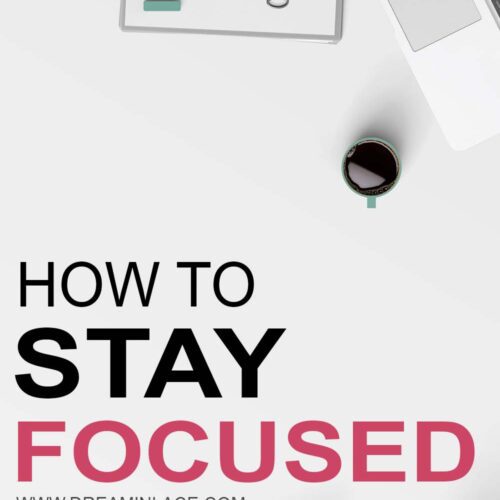Let’s rip off the bandaid and discuss how to handle criticism at work. These are my tips for redirecting negative feedback to help you grow professionally!

Today I want to rip off the bandaid and talk openly about something we’ve all faced at one point or another in our careers: criticism.
No matter your industry or career objective, knowing how to handle criticism at work is something that takes time and experience. While I’ve become a pro at shouldering criticism professionally now, that definitely wasn’t always the case. In fact, I can remember multiple occasions where I left the office feeling personally defeated.
Want an example? Once I was leading a presentation on a project I’d invested a lot of time and energy in. I’d done my best to think through the viewpoints of everyone in attendance so I was prepared to quickly address any concerns or questions that might arise. When the meeting kicked off, though, there was an unfamiliar face at the roundtable. This professional was never introduced to me and had a job I was not aware of – but they absolutely had a stake in the presentation. Going forward, I was met with strong pushback and criticism on everything I had planned and worked on. Essentially, she thought the whole thing sucked and wasn’t afraid of letting me know.
Now, if this happened to me today I would respond in a completely different way…but at the time I was devastated. I ignored my instinct to crawl under the table and hide, did my best to finish the meeting as productively as I could and then — fled the office, in tears.
In the days that followed, I learned without question she had just reason to be concerned and we went on to have a pretty good working relationship. But no doubt, that was a steep learning curve I did not see coming.
The big lesson of that experience? Learning that everyone has their own take on something in the workplace and when you put some effort into understanding their point of view, you’ll often it find it 100% justified. So at face value, what I perceived as strong criticism was actually a sound argument for why my plan would not work. As my perspective changed, so did my opinion on criticism altogether.
How to Handle Criticism at Work
Now that I’ve taken a somewhat *cringe* walk down memory lane, I want to share how I’ve evolved to a point where criticism doesn’t bother me. Yes, I personally have down a lot of toughening up — but my whole perspective on criticism has also changed and I no longer see it as a negative.
There are so many topics related careers that I think make for interesting discussions, but this one is definitely at the top of my list because of how universal it is. Truly, no matter what field or profession you are in…you’re guaranteed to face criticism in the workplace at some point. When it does arise, how can you manage it in a way that benefits you?
Here are my top tips to help you absorb the criticism and rise above!

Take Nothing Personally
First and foremost, we have to address the biggest elephant in the room that is often the underlying reason you may struggle to handle criticism in the workplace. That, of course, is that you take the criticism personally.
Early on in my professional career, I thought “Why of course I take it personally! I’m personally invested in my work so how could I not?”
Over time, though, I’ve come to see exactly what people mean when they said the cliche phrase “It’s not personal, it’s business.” Let’s think about this.
Have you ever worked with someone you personally really enjoy – but simply can’t stand working with?
You connect on a personal level, but professionally speaking don’t mesh? They may always be late, cut corners, make mistakes or simply have a different way of doing things than you. They might even drive you up a wall at work, but you enjoy them as a person and can still laugh with them.
The way you are able to separate a person from their work in that case also applies to managers and clients. As we know, everyone has their own point of view. Meaning? There’s simply no way we’re all going to agree and get along on everything. If you present something at work that’s not appreciated or someone finds fault with, do not take it as a personal attack. Simply put, it’s often “not that deep”. It’s surface level business.
Remember, for the great good of the company criticism may have value — but it is not to be taken as a reflection of you personally.
Criticism is a Tool for Improvement
Criticism in the workplace is a tool for improvement. Period.
And one of the biggest things I’ve learned in my professional experience is that literally everything has room for improvement. You can knock a project, event or goal out of the park — but still find ways to improve what you’re doing for next time. Nothing is stagnant, everything has room to grow and the sooner you start thinking of criticism as a negative…you’ll start to realize it’s actually a blueprint on how you can do better.
Constructive Criticism Feedback
In line with my philosophy that criticism is ultimately a tool for improvement is my belief that it’s “constructive feedback”, rather than criticism.
I’m so of this mindset that I’ve completely removed the term ‘constructive criticism’ from my vocabulary. It’s simply not accurate! I know when I’m reviewing and providing input, any feedback I offer is intended to help improve the situation. And odds are, that’s also the case when you’re on the receiving end of any constructive feedback that’s somewhat negative.
Thinking on how to handle criticism at work, I can’t help but think of how it benefits us professionally. Sure, we all appreciate a good pat on the back now and then. But, how much do you really learn from heaps of praise? Odds are, not nearly as much as you do from constructive feedback. That’s where the lessons are!
Accept Criticism but Don’t Dwell On It
Another great way to handle criticism professionally is to establish a time limit on how long you have to process and dwell on it.
We’ve all had those nights where our mind replays something over and over and over again on a steady loop. Sometimes that even carries over to the workday, where you simply can’t shake off the negative feedback.
Allow yourself to dwell on the situation and throw yourself a little pity party if you must, but also set an end time. For me, I usually let myself stew a little bit before setting a cut off time of around 9 pm that day. Any longer than that fails to be useful to me and tends to keeps me up at night. If something happens towards the end of the work week, I’ll typically let myself take the weekend to feel crummy before regrouping Sunday evening with plans to start the new work week strong on Monday.
Find a timeline that works for you and stick to it. Once that time comes to an end, mentally cut yourself off from thinking about the situation and redirect that energy towards making a game plan for moving forward.
Control the Controllable
My last piece of advice to help you handle criticism at work? Focus on what you have the ability to control moving forward.
Every industry and every profession comes with its own set of variables. Some you have control over, others you do not. When facing criticism, focus on addressing the areas you can control and resist the urge to make excuses about the rest.
The more you have your ducks in a row, the better. Relying on outside information or vendors to assist? Plan for delays. Don’t hand over the power to halt your ability to meet your objective on time.
More Career Content:
Now that you know how to handle criticism at work, be sure to checkout this post to help you manage multiple projects simultaneously like a pro!!
Join the Dream Squad
Sign up for my weekly newsletter to receive exclusive dreamer content you won’t find on Dream in Lace straight in your inbox. Let’s be dreamers, together!
Stay stylish and chase your dreams!
XOXO
Kelly
TWITTER * INSTAGRAM * FACEBOOK








Thanks for sharing these tips!
xx Chelsea
http://www.organizedmessblog.com
Thanks so much for reading! I hope they were helpful. xo